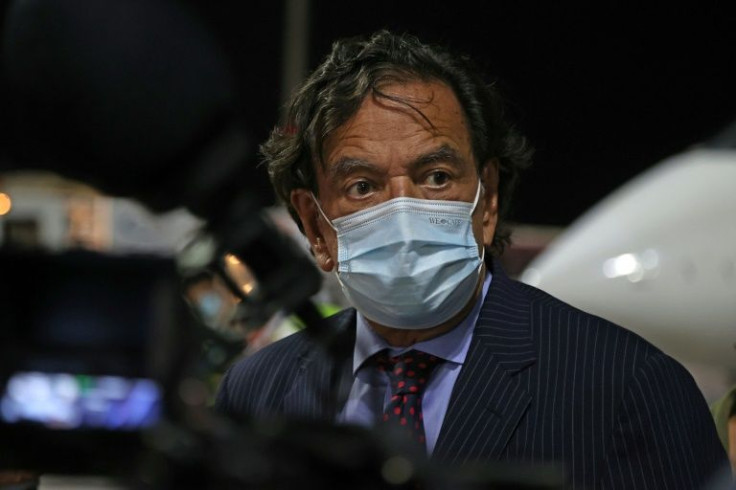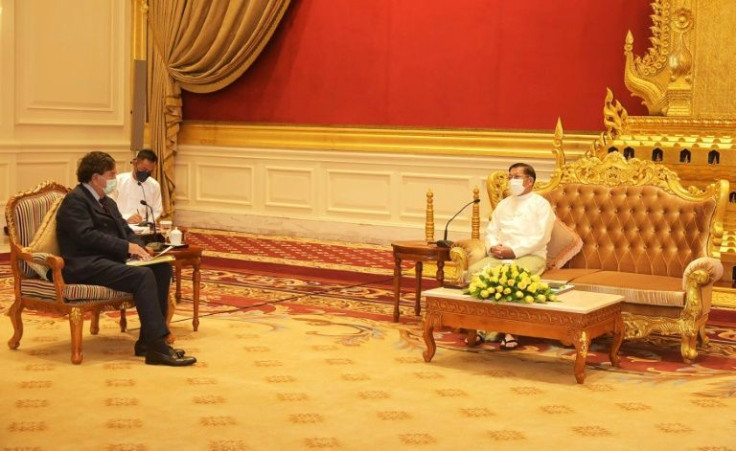Bill Richardson: Former US Diplomat, Global Troubleshooter
Bill Richardson has served as an ambassador, cabinet secretary and governor of New Mexico, but since he returned to being a regular US citizen, he has dedicated his life to a role with similarly high stakes.
Richardson is a freelance envoy, specializing in high-profile, difficult negotiations to obtain the release of Americans detained by hostile governments.
And on Monday, he celebrated his 74th birthday with his latest victory: facilitating the release of American journalist Danny Fenster from a prison in Myanmar, where he was jailed for 11 years last week -- and faced a possible life sentence.
Fenster was freed on "humanitarian grounds" and deported by the ruling junta in Myanmar.
The Richardson Center, founded by the former US ambassador to the United Nations, tweeted a photo of him standing with Fenster in front of a small plane on the tarmac in Myanmar's capital Naypyidaw.
The center said the release of the 37-year-old Fenster had been secured following "face-to-face negotiations" between Richardson and junta chief Min Aung Hlaing, who is the target of US sanctions after seizing power in a February coup.
However, just a week ago, Richardson had told AFP in an interview, at the conclusion of a previous "humanitarian" mission to Myanmar, that he had not raised Fenster's case in his meetings.

At the time, he said, without offering more details, that the State Department had specifically asked him not to discuss the issue.
In private, US officials suggested they were frustrated by Richardson's activism, and expressed concern that it could undermine Washington's official efforts on Fenster's behalf.
The State Department had regularly insisted it was doing everything in its power to obtain Fenster's freedom.
On Monday after Fenster's release, department spokesman Ned Price reiterated that Richardson had not gone to Myanmar "at the direction of the US government."
But he added: "We have been in regular and, in more recent hours, almost constant contact with the governor and with his team."
In a statement, Fenster's family offered thanks to all who helped secure his release, "especially Ambassador Richardson" -- without a specific word of thanks to the US government.
US Secretary of State Antony Blinken thanked the veteran Democrat as well.

Born on November 15, 1947, Richardson -- son of a Mexican mother and American father -- showed an early flair for baseball, and was drafted as a pitcher by the Kansas City Royals.
When a professional career in sports did not pan out, Richardson earned a bachelor's degree at Tufts University and did a Master's degree at its prestigious Fletcher School of Law and Diplomacy.
He was one of the first members of the Hispanic community to assume a cabinet-level position in the US government.
His resume is impressive: he is a former congressman, UN envoy, energy secretary under Bill Clinton in the late 1990s, and then two-term governor of New Mexico.
Richardson was the first Latino to run for the US presidency, with a fleeting bid in the Democratic primaries in 2007 -- a process that eventually yielded Barack Obama as the party's candidate.
Richardson backed Obama, but ended up withdrawing his name from consideration to be his commerce secretary when a federal investigation over campaign finance derailed his nomination in 2009.
In parallel with his traditional career in politics, Richardson developed a reputation as a diplomatic gunslinger, and was even sometimes dubbed the "Indiana Jones" of American diplomacy.
He held high-stakes private face-to-face meetings with a who's who of strongmen on the US pariah list, including Iraq's Saddam Hussein, Cuba's Fidel Castro, North Korea's Kim Jong Il (father of current leader Kim Jong Un) and Venezuela's Nicolas Maduro.
The Richardson Center for Global Engagement says one of its primary missions is "negotiating for the release of prisoners and hostages held by hostile regimes or criminal organizations."
Indeed, Richardson has several successes under his belt, but also a few setbacks, which are deftly underplayed by his media-savvy team.
His missions have extended to wider political issues, such as North Korea's nuclear program or diplomatic overtures to Myanmar's junta -- work that has elicited criticism from rights activists who accuse him of offering legitimacy to authoritarian regimes.
"I'm not a government. I don't legitimize governments," Richardson told AFP last week.
"I'm just one person that is trying to make a difference."
© Copyright AFP 2024. All rights reserved.





















